Propaganda in action: Qatari media at the service of HTS regime in Syria
By Alireza Akbari
In light of recent developments in Syria, Qatari media outlets have deviously crafted narratives that closely mirror the approach of Western media in distorting facts on the ground.
Since the overthrow of the Bashar al-Assad government by a coalition of militant groups led by Hayat Tahrir al-Sham (HTS), Qatari media outlets have gradually shifted their attention to Syria.
Mirroring their Western counterparts, these outlets have employed various tactics to whitewash the dark history of HTS and other militant factions while downplaying ongoing atrocities against religious and ethnic minorities in the Arab country.
Following the HTS militant group’s takeover of Damascus (formerly operating as the Al-Nusra Front), Syria has experienced a series of turbulent events. These include Israeli expansionism along its borders, airstrikes targeting Syrian military sites, and widespread media propaganda.
Media organizations such as Al-Jazeera, Middle East Eye, and The New Arab (Al-Araby Al-Jadeed) have been accused of deliberately ignoring these alarming developments while amplifying unverified news reports and painting the new ruling establishment as clean and capable.
These media outlets have amplified misleading narratives, including exaggerated reports about prisoners in Syrian jails and claims of so-called "mass graves."
According to media analysts, their focus has largely been on rehabilitating the image of HTS commander Abu Mohammad al-Jolani, who previously fought in Syria and Iraq under the banners of Daesh and al-Qaeda terrorist groups.
According to Australian analyst and academic Tim Anderson, Al-Jazeera's owner was a major funder of the al-Qaeda- affiliated groups (Nusra Front/HTS) which have now taken over Damascus.
It was evident in the way Al-Jazeera and other Qatari media outlets shifted focus from Gaza to Syria soon after Assad left the country, hailing and celebrating the so-called “revolution.”
Al Jazeera’s Syrian narrative
Headquartered in Wadi Al Sail, Doha, the Qatari government-funded media conglomerate Al Jazeera was among the first outlets to report on developments in Syria after a ceasefire was brokered between the Israeli regime and Lebanon after nearly 70 days of Zionist military aggression.
Al-Jazeera provided minute-to-minute coverage of the dramatic advances made by HTS militants, starting from Aleppo, hailing the militants as "liberators" of the Arab country that was governed by a democratically-elected entity under the harshest Western sanctions.
Al-Jazeera has been described as a “key soft power tool for Qatar and US imperialism,” with critics stating that the network plays a pivotal role in advancing their foreign and regional policies.
Observers previously noted instances where the channel adjusted its editorial stance, such as moderating coverage on Gaza at the request of US officials through Qatari officials.
The use of language on the events unfolding in Gaza, stopping short of calling it a "genocide" and refusing to call the regime in Tel Aviv an "occupation" has been a part of a carefully calibrated policy of the Qatari television network to please the Western patrons of the Israeli regime.
Since 2011, the Qatari network has been accused of shaping narratives to support the Arab country's ambitions to influence “regime changes” in Libya, Mali, Egypt, and Syria.
In Syria, Al Jazeera's coverage in 2012 led to internal dissent, with several journalists resigning to establish Al Mayadeen—a channel positioned as a counterweight to Qatari-backed narratives.

Media analysts highlighted this exodus as evidence of growing dissatisfaction with the network's editorial policies on Syria and the rest of the West Asia region.
Observers have also noted that Al Jazeera “cautiously broadcasted directly from media and military headquarters in Syria,” raising questions about its on-the-ground reporting strategy.
On December 8, the network ran a story titled “What happened in Syria? How did al-Assad fall", which said the “opposition forces” had taken control of the capital following a major “offensive.”
It further noted that these forces had declared Syria “liberated” from the rule of Assad.
The following day, on December 9, Al Jazeera published a report on Sednaya prison, quoting Raed al-Saleh, the head of Syria’s White Helmets, who described the facility as a “hell” for detainees.
The story claimed that the "armed groups" had stormed the prison, releasing thousands of inmates as they advanced toward Damascus.
However, the Association of Detainees and Missing Persons of Sednaya Prison (ADMSP) contested these claims. The organization obtained an official document revealing that, as of November 28, 2024, the prison population stood at 4,300, casting doubt on the accuracy of Al Jazeera’s report.
On December 23, Al Jazeera sparked further controversy by claiming the discovery of “mass graves” in Syria. The report, titled “What Returning to Syria in the midst of the Euphoria and horror of uncovering the Assads’ mass graves felt like,” painted an unrealistic picture of the country.
MEE toeing Al-Jazeera line
Another Qatari-funded media outlet, the UK-based Middle East Eye (MEE), has also faced sharp criticism from activists over its biased and distorted coverage of events unfolding in Syria.
Following Israeli Prime Minister Benjamin Netanyahu’s December 17 visit to Mount Hermon in the occupied Golan Heights, MEE ran a December 20 story titled “Revealed: How Israel’s plan to carve up Syria was thwarted by Assad’s downfall.”
The article cited unnamed security sources as saying that Israel aimed to preserve Assad’s rule under Emirati influence while forging military and strategic alliances with the Kurds in the northeast and the Druze in the south.
The publication coincided with increased Israeli expansionism within Syrian territory, with tanks and armored bulldozers repeatedly breaching Syria’s sovereignty, advancing perilously close to Damascus.
Claims by the MEE that the Israeli regime supported Assad, despite Netanyahu’s framing his visit to Mount Hermon as an “assessment” of further military activities, were criticized by analysts as unrealistic and disconnected from the realities on the ground.
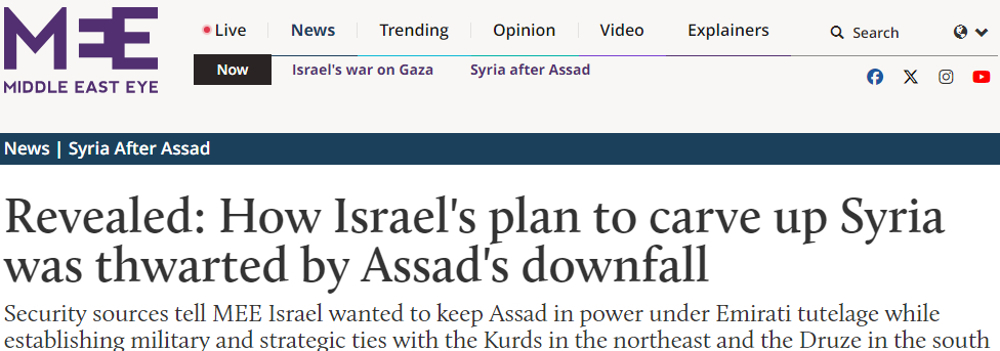
MEE further claimed that the "overthrow" of Assad in Syria had derailed an Israeli plan to divide the Arab country into three blocs, in an attempt to club the apartheid regime and Assad together.
Despite HTS leader al-Jolani’s claims of avoiding “conflict” with Israel, the Israeli regime persisted with its all-out aggression on Syrian soil, questioning MEE’s portrayal of events.
Analysts described the outlet’s claims as a deliberate misrepresentation of facts, particularly in light of Israeli incursions and airstrikes on Syrian military bases in the post-Assad era.
The New Arab, a London-based outlet owned by the Qatari company Fadaat Media, has echoed same assertions on the developments in Syria and the end of Assad's long reign in power.
In its December 28 article titled “Israel reportedly ‘communicated with Assad on WhatsApp,’” the publication claimed that the Israeli regime had been in contact with Assad via the messaging app to "reduce Iranian and Hezbollah activity" in Syria.
In a follow-up, The New Arab cited the Israeli daily Yedioth Ahronoth, alleging clandestine communications between Tel Aviv and Assad's inner circle.
According to the report, Israeli intelligence agents reportedly sent messages on the WhatsApp app, posing as "Musa" to establish contact with Assad and his advisors.
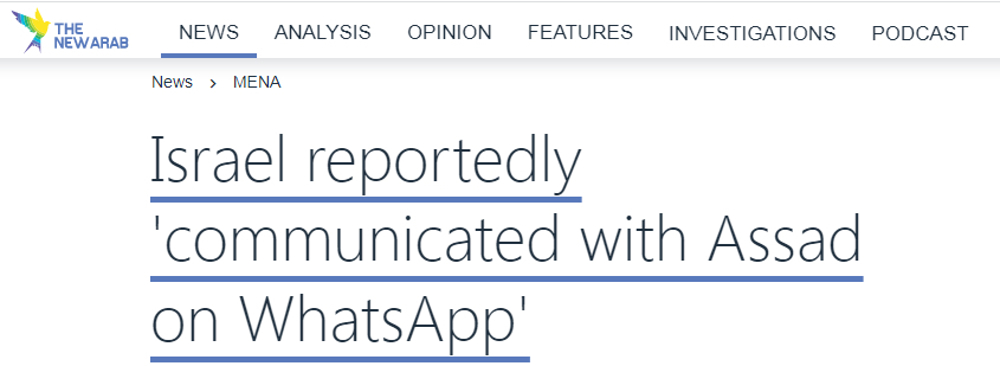
These claims surfaced amid significant geopolitical shifts. On December 9, a day after Assad's fall, Netanyahu appeared in a video message, calling the development a “historic moment.”
He revealed that the Israeli military had been instructed to undertake a "limited defensive action."
Analysts later linked this move to the broader framework of the so-called "Greater Israel" plan, which seeks to expand the occupation beyond the Palestinian territories.
Critics argue that such narratives, promoted by Qatari media outlets, aim to shift the focus from Israeli violations of Syrian sovereignty and territorial integrity while aligning with Qatar’s regional strategy.
Pertinently, Qatari minister of state for foreign affairs Mohammed Al-Khelaifi led a high-ranking delegation to Damascus recently and met extensive deliberations with HTS leader al-Julani.
"Qatar has a special priority in Syria, due to its honorable stance towards the Syrian people. The Qataris expressed their readiness to invest in Syria,” al-Julani said after the meeting.
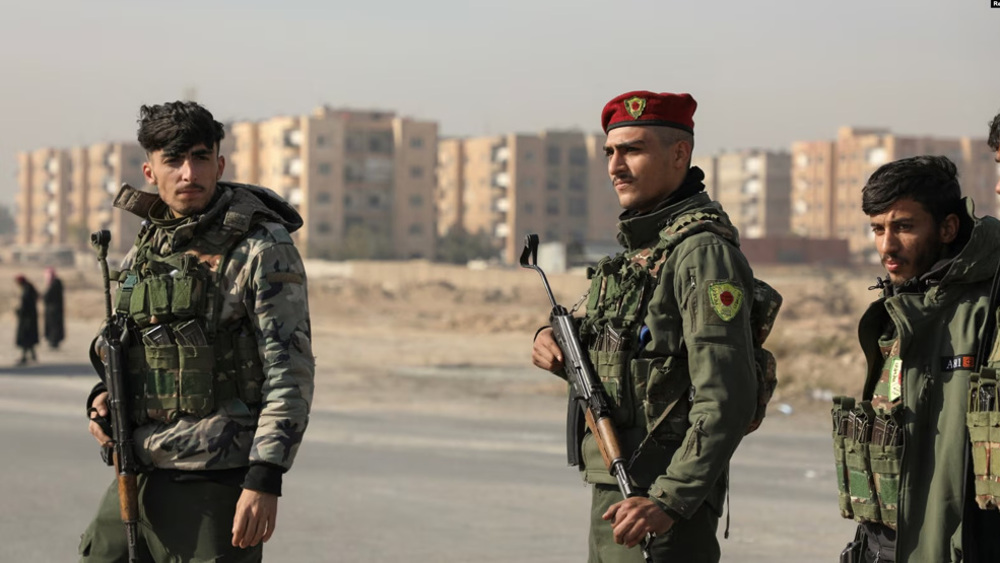
Syria's Kurds reject legitimacy of new 'transitional government'
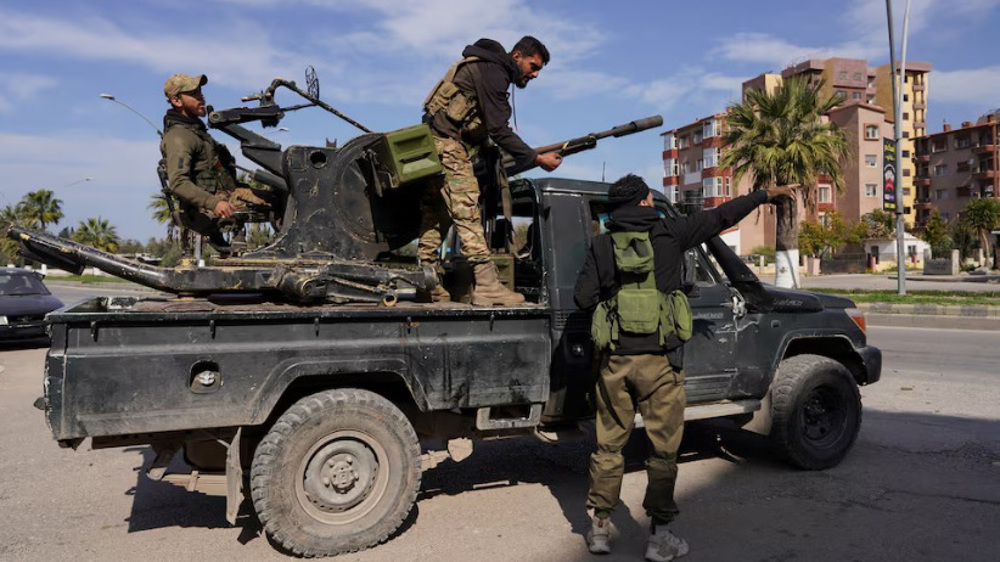
US embassy in Syria tells Americans to leave, warns of increased risk of attacks
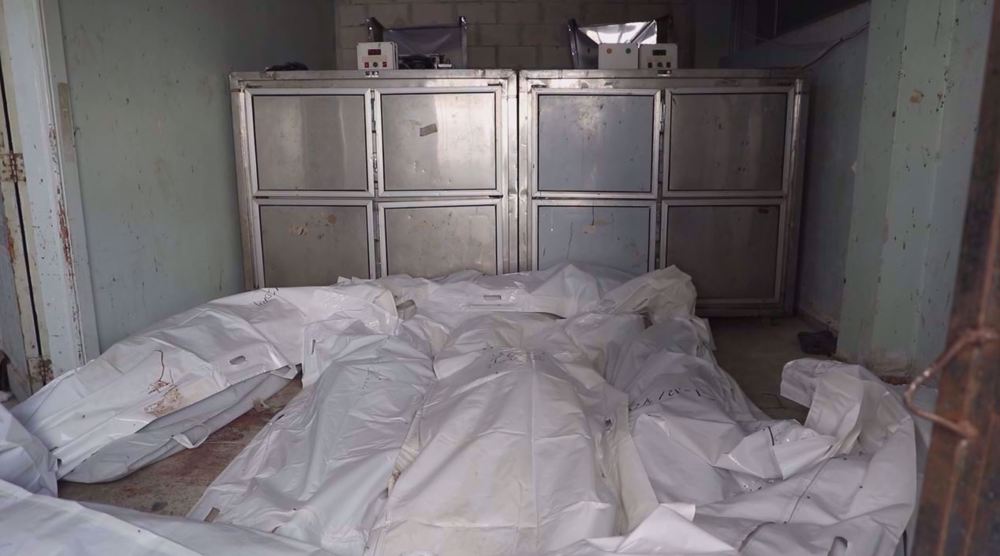
Survivors recount traumas of HTS massacres in Syria
Palestinian teenager dies in Israel's jail after being held 6 months without charge
Pro-Palestinian student leaves US amid deportation threats
US announces new sanctions targeting Iran’s drone program
Israel has killed over 300 children since it broke Gaza ceasefire: UNICEF
Iran determined to implement all its agreements with Iraq: President Pezeshkian
VIDEO | Leader meets with ambassadors, officials on Eid al-Fitr
Iran to inaugurate second phase of Chabahar spaceport
Qatar joins Israel for 'side by side training' in aerial drills in Greece


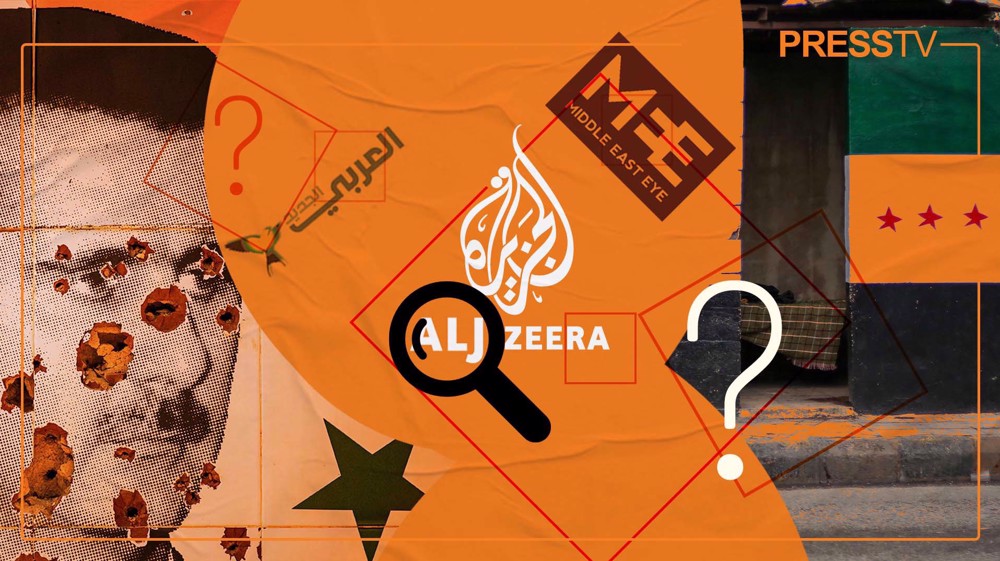
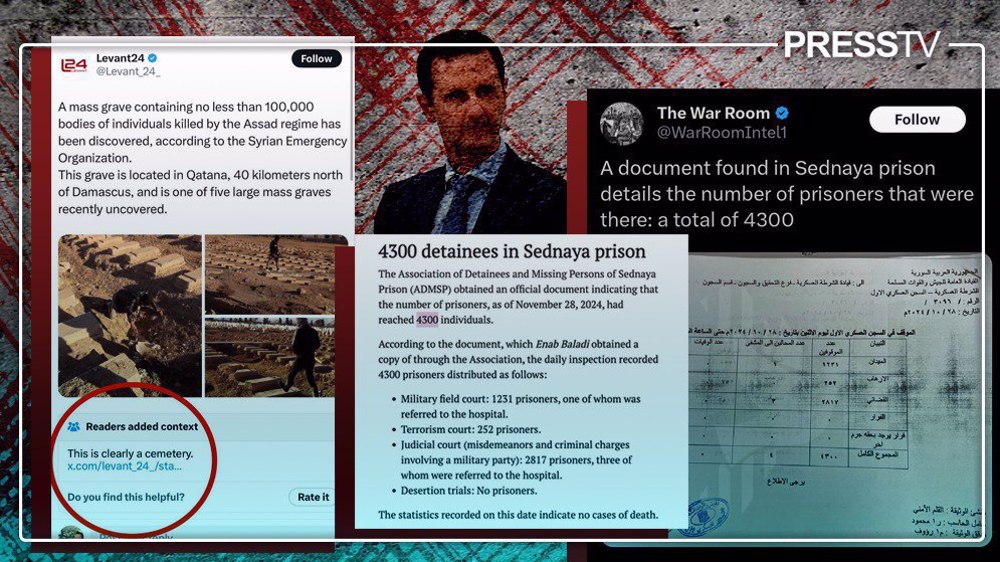



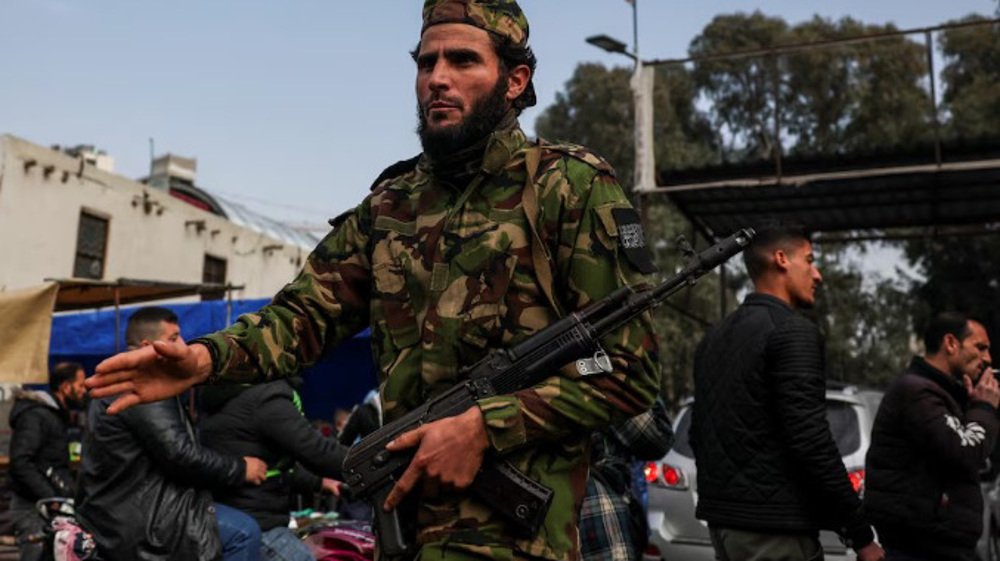
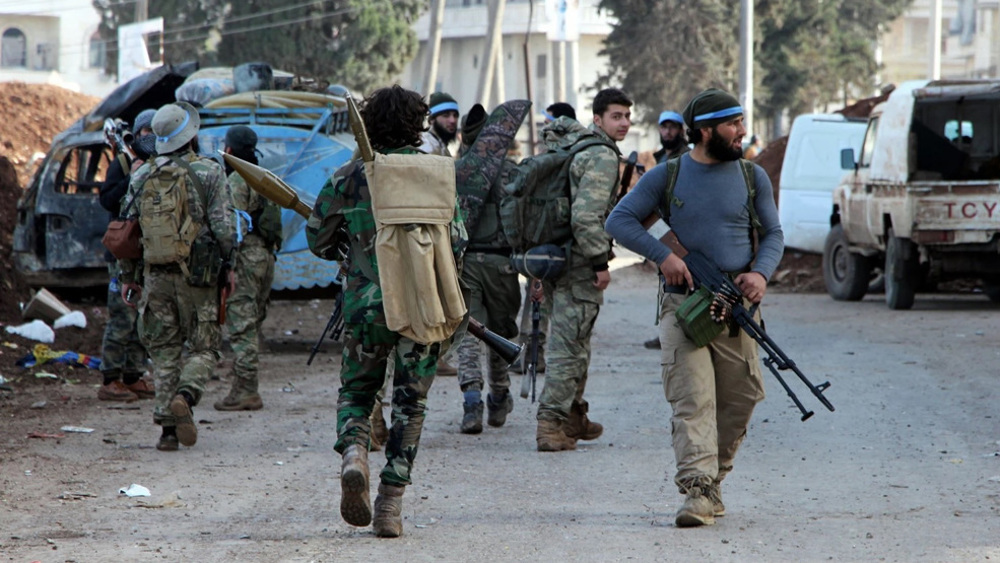
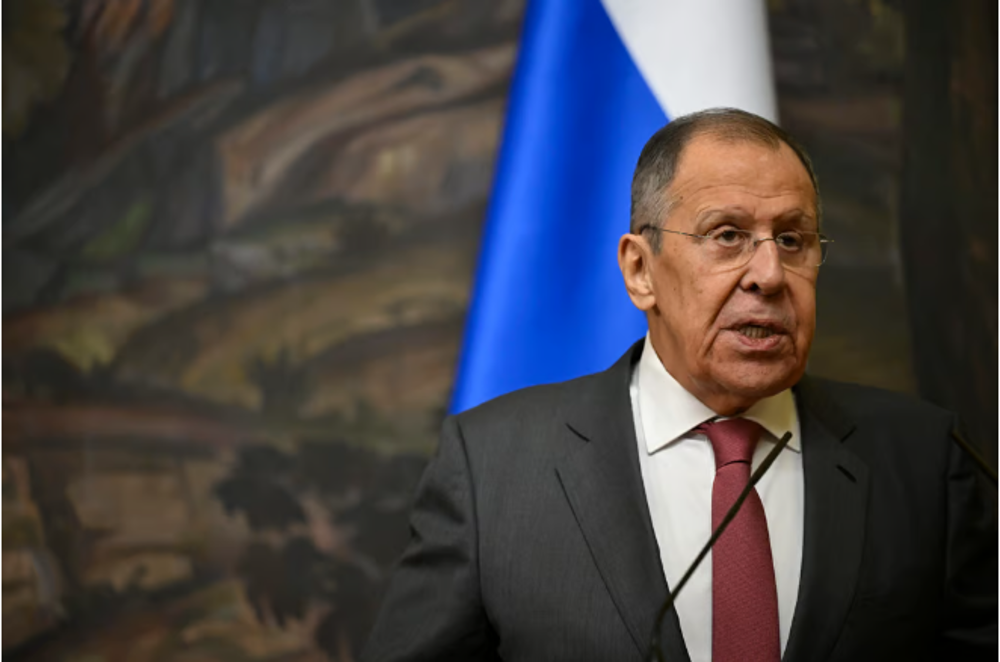
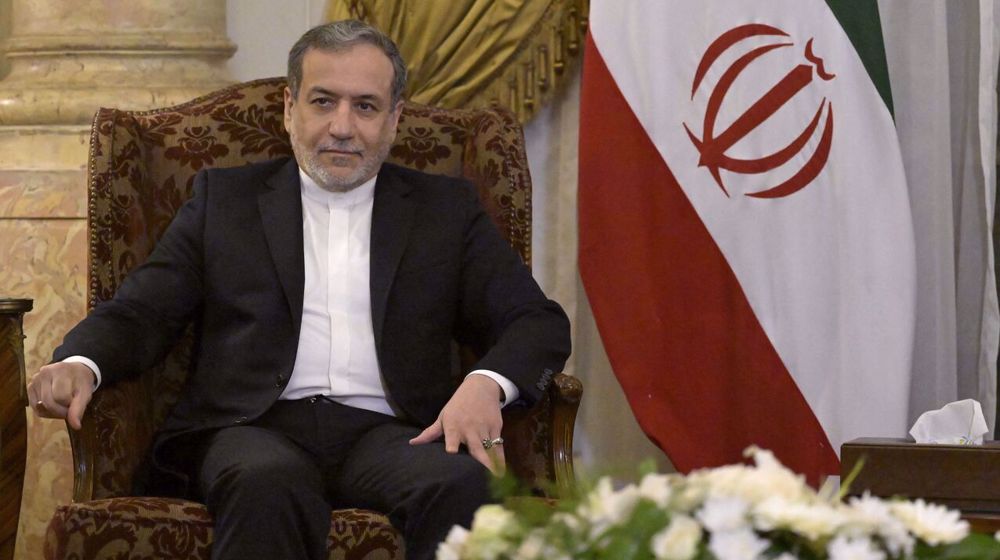
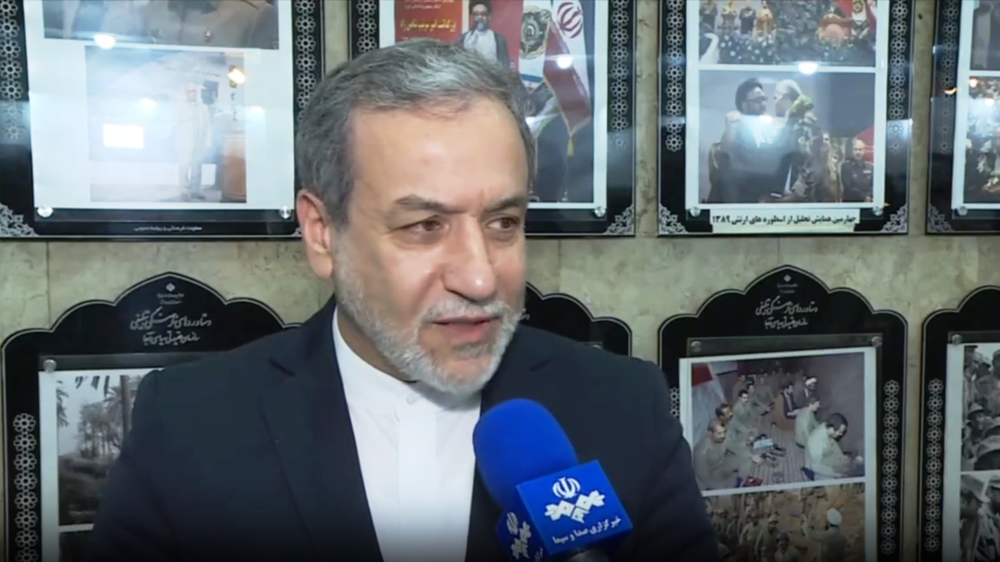

 This makes it easy to access the Press TV website
This makes it easy to access the Press TV website